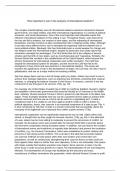How important is war in the analysis of international relations?
The complex interdisciplinary area of international relations examines interactions between
governments, non-state entities, and other international organisations in a variety of political,
economic, and social dimensions. One of the most important and influential events that
influence international relations in this setting is war. Throughout history, wars have led to
the rise and fall of empires, the creation of new states, and the redrawing of international
boundaries, and they continue to play a fundamental role in shaping society today. Although
it can take many different forms, war is ultimately the organised violence between two or
more political entities, (Barkawi). War has historically been a crucial weapon for change and
has helped create the international system, despite its destructive and costly nature that
sometimes outweigh the advantages. The First World War led to the collapse of several
empires and the birth of new states, such as Czechoslovakia and Yugoslavia. Similarly, the
Second World War resulted in the establishment of the United Nations, which became the
primary framework for international cooperation and conflict resolution. The Cold War
shaped the international system for decades, and the end of the Cold War led to the
emergence of new actors and new dynamics in international relations. This essay will
examine the significance of war in the development of states, the Civil War, the role of war in
globalisation, and war as a major method of resolving conflicts.
War has always been used as a tool of foreign policy by states. States may resort to war to
achieve their strategic objectives, such as acquiring new territories, protecting their national
interests, or changing the balance of power in their favour. In essence, coercion is the key
component of war that gives it its success. (Tilly, pg. 70).
For example, the United States invaded Iraq in 2003 to overthrow Saddam Hussein's regime
and establish a democratic government that would be friendly to US interests in the Middle
East. Similarly, Russia annexed Crimea in 2014 to protect its vital interests in the Black Sea
region. These examples illustrate how war can be a powerful tool for states to achieve their
desired outcomes and how war as a force can be used as a negotiating tool’. A state is
considered weak if it is unable to use force against another entity in order to further its
political objectives, hence, why coercion is an essential component of a state as per Tilly. It
is also mentioned by Tilly that “A state is a human community that successfully claims the
monopoly of the legitimate use of physical force within a given territory” (Tilly).
International cooperation can be significantly impacted by war as well. States either built,
seized, or bought them as they sought to increase coercion. (Tilly, pg. 84). In the aftermath
of a war, states may be more willing to cooperate to prevent the recurrence of conflict. An
example, the European Union was created after the Second World War to promote peace
and economic cooperation among European states. In addition, war can lead to the creation
of international norms and institutions to regulate state behaviour and prevent the escalation
of conflicts, e.g., the Geneva Conventions, which were established to protect civilians and
prisoners of war during armed conflicts. This is all due to the idea that successful nations
use coercive methods to keep peace within their own borders and control their own
populations, as well as continuously strengthening their coercive forces so they could use
them against other states to further their own objectives, if this is not achievable, then peace
with states outside their borders would be more logical. Since coercion is clear to be the
prime focus in order to pursue growth as a nation, the industrialisation of war and weaponry
followed. The development of Europe was facilitated by the discovery and mass
manufacture of military innovations like gunpowder, which allowed Western Europe to profit




